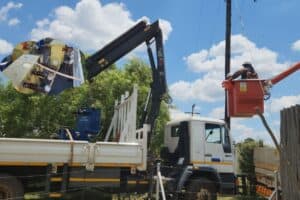Free Basic Electricity is the amount of electricity that is deemed sufficient to provide basic electricity services to poor households.

With many South African households struggling to make ends meet amid the economic fallout from the Covid-19 pandemic, Eskom is raising awareness about its longstanding Free Basic Electricity (FBE) programme, which is targeted at giving limited free electricity to indigent households.
But how does the programme work and who qualifies for FBE?
What is free basic electricity?
FBE is the amount of electricity that is deemed sufficient to provide basic electricity services to poor households. This amount of energy will be sufficient to provide basic lighting, media access, water heating using a kettle and ironing for grid-connected consumers – homes connected through the national electrification programme.
What amount of electricity will be considered free basic electricity?
The maximum amount is between 50kWh and 60kWh per household, depending on the area of the municipality you reside in.
Who is supposed to get the free basic electricity per month?
Qualifying households, in terms of the government’s policy of providing support to the unemployed, low-earning, the destitute and the elderly, are encouraged to approach their municipalities to register as indigents in order to collect their allocated free basic electricity every month.
ALSO READ: CEO paints sobering picture of Eskom’s woes
Once registered with the municipality, the customer’s details are loaded onto Eskom’s system where they get credited with free electricity tokens.
How to check if you qualify for Eskom’s FBE?
Consumers can visit their local municipal office, ask a ward councillor or community development workers about the programme.
You can also contact Eskom on 0860-037-566.
How would one know when the 50kWh/60kWh has been exceeded?
For a prepaid meter, a household will be provided with a non-interchangeable voucher or token loaded with free basic units per month. When the free units have been used up, the consumer will need to buy additional units at the prevailing approved rates.
ALSO READ: Eskom spending R10m per hour to burn diesel
For credit-metered customers, the total units consumed will be reduced by the amount of free basic units. But, it is not easy to see when the free units are exceeded.
What happens in areas where Eskom is the provider rather than municipalities?
Local government is responsible for the provision of basic services in its area of control. Eskom is providing a service on behalf of municipalities. Even in a case like this, municipalities will still be responsible for funding the provision of free basic services.
Where government grants are paid to municipalities, these must be paid to Eskom to cover the cost of providing free basic electricity to the targeted households.
Do you qualify for Free Basic Electricity (FBE)?
If you are not sure, contact your local municipality to find out and they will guide you through the registration process.
Once registered, you must collect your FBE token every month from an Eskom vending outlet pic.twitter.com/EkWzjTQFAF
— Eskom Hld SOC Ltd (@Eskom_SA) February 11, 2021
READ NEXT: Eskom’s De Ruyter must be replaced, creditors need a ‘haircut’, says Saftu
For more news your way, download The Citizen’s app for iOS and Android.
Support Local Journalism
Add The Citizen as a Preferred Source on Google and follow us on Google News to see more of our trusted reporting in Google News and Top Stories.








